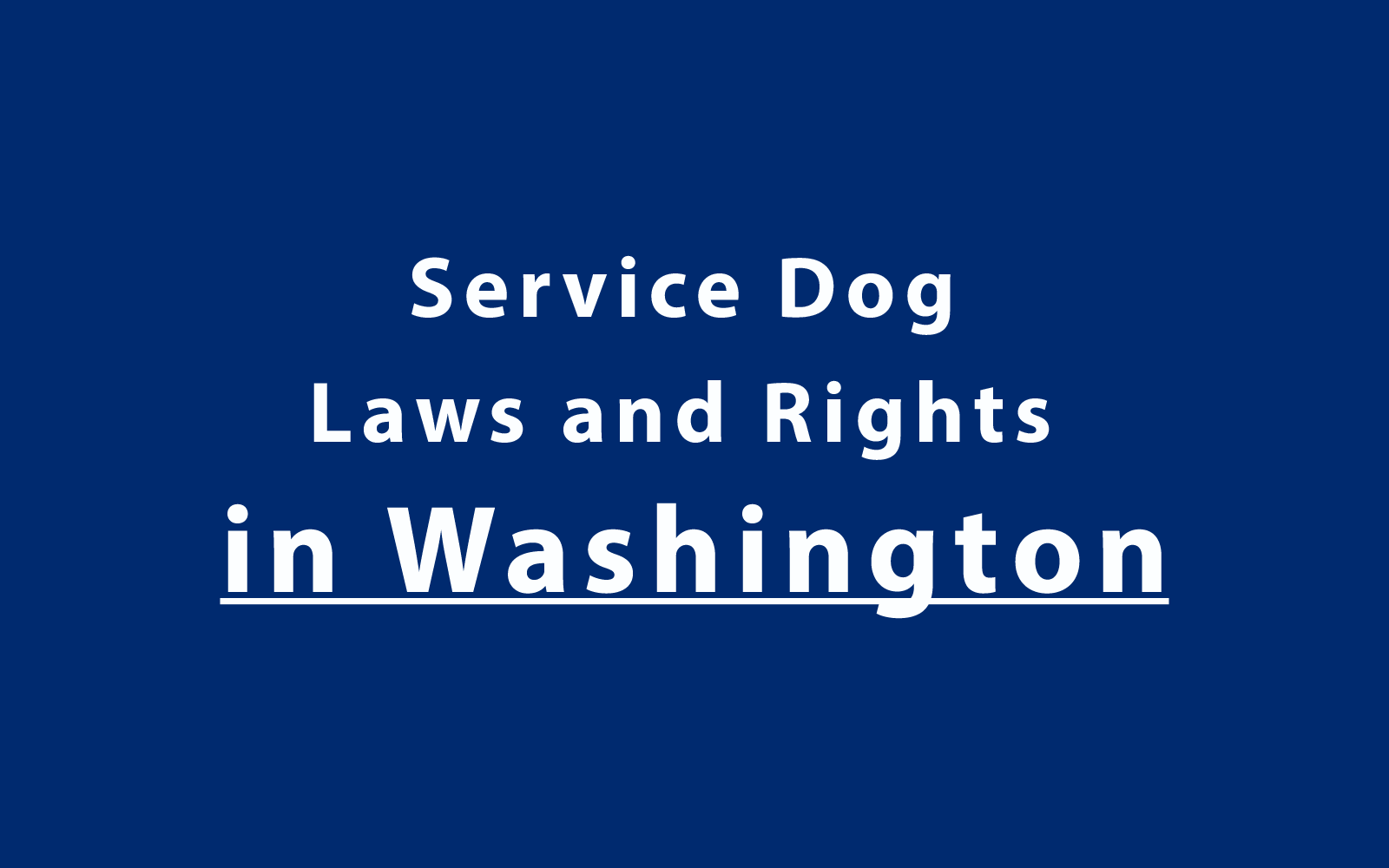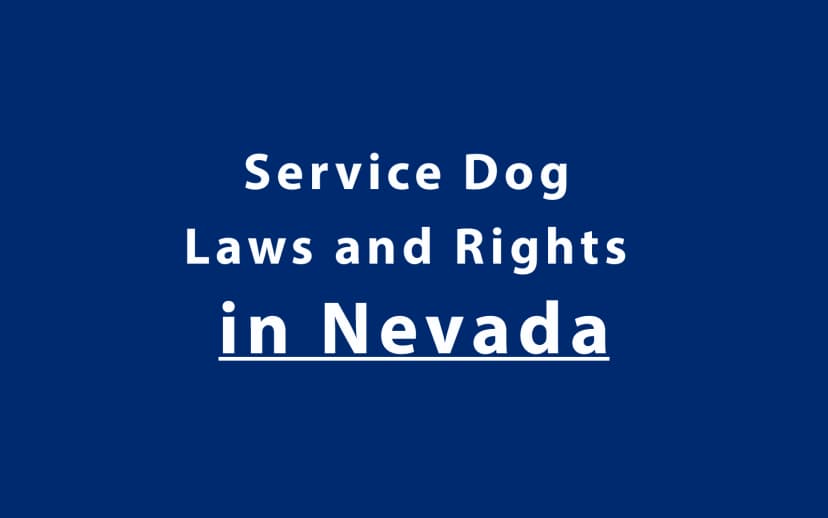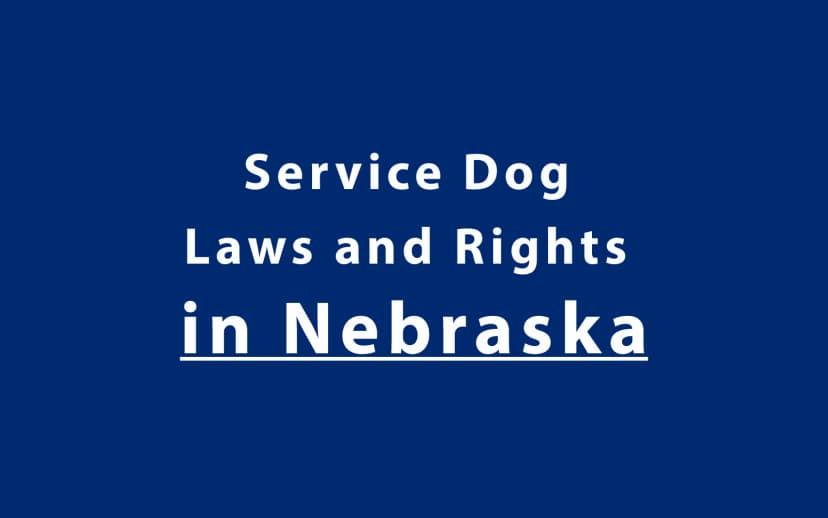Service Dog Laws and Rights in Washington

Service dogs are more than just companions—they are essential aides for individuals with physical, sensory, psychiatric, and neurological disabilities. In Washington State, a robust legal framework supports the rights of service dog handlers, drawing from both federal and state legislation. This guide explains the 2025 protections and responsibilities under the ADA, the Fair Housing Act, Air Carrier Access Act, and Washington-specific laws to help handlers, employers, landlords, and public entities understand their obligations.
What Qualifies as a Service Dog in Washington
According to the Americans with Disabilities Act (ADA) and RCW 70.84.021, a service dog is defined as a dog that is individually trained to perform tasks or work directly related to a person’s disability.
Qualifying tasks include:
• Guiding individuals with visual impairments
• Alerting to oncoming seizures
• Retrieving dropped items or opening doors
• Interrupting self-harming behavior or panic attacks
• Providing tactile grounding for PTSD flashbacks
Not considered service animals:
• Emotional Support Animals (ESAs)
• Therapy animals
• Comfort pets not trained to perform specific tasks
In Washington, only dogs are recognized as service animals under public access law, and they must be trained for task-specific assistance. However, service dogs in training are also given limited access when accompanied by trainers.
Public Access Rights in Washington
Under the ADA and Washington law, service dog handlers have the right to bring their dogs into any public place where the general public is permitted.
These places include:
• Restaurants and cafés
• Hotels and motels
• Grocery stores and retail outlets
• Libraries and museums
• Parks and public beaches
• Public transit terminals and buses
Staff at public venues may only ask:
1. Is the dog required due to a disability?
2. What task is the dog trained to perform?
They may not:
• Ask for certification or ID
• Require task demonstration
• Request medical information
The handler must ensure the dog is under control (on a leash, harness, or under voice control) and not posing a threat. If the dog is aggressive, disruptive, or not housebroken, the establishment may lawfully ask the team to leave.
Housing Rights in Washington
The Fair Housing Act (FHA) and state law prohibit housing discrimination against individuals with disabilities who use service animals or emotional support animals (ESAs).
Housing rights include:
• Right to live with a service dog or ESA, even in “no pets” housing
• Landlords may not impose breed, size, or weight restrictions
• No pet fees or deposits can be charged
Documentation requirements:
• If the need is not obvious, landlords may request a letter from a licensed healthcare provider stating that the animal is necessary for the person’s disability
• They may not demand training records or registration papers
Complaints can be directed to the Washington State Human Rights Commission or the U.S. Department of Housing and Urban Development (HUD).
Employment Rights in Washington
Service dog use in the workplace is protected by ADA Title I and the Washington Law Against Discrimination (WLAD). Employees with disabilities can request the use of a service dog as a reasonable accommodation.
Accommodation process:
• Submit a formal request to HR or a supervisor
• Provide documentation if the disability or need is not obvious
• Collaborate in an interactive process to determine reasonable adjustments
Employers may only deny a request if the presence of the dog causes undue hardship or disrupts essential business operations. Disputes can be taken to the EEOC or the Washington State Human Rights Commission.
Travel & Transportation Rights
Air Travel (ACAA)
Under the Air Carrier Access Act, service dogs are permitted to fly in the cabin with their handler on U.S. and international airlines. Airlines may require:
• DOT Service Animal Air Transportation Form confirming behavior, training, and health
Ground Transit (ADA)
Service dogs must be allowed on:
• City buses and light rail
• Amtrak and long-distance trains
• Ferries and airport shuttles
• Ride-sharing services like Uber and Lyft
A refusal to accommodate a service dog can be reported to the U.S. Department of Transportation or Washington Department of Transportation.
Service Dogs in Education
K–12 Schools
Students with service dogs are protected under the ADA, Section 504, and Individuals with Disabilities Education Act (IDEA). Schools must allow service dogs:
• In classrooms
• On buses
• During school activities
They may not require:
• Proof of certification
• Handler to pay a fee
• Dog to be removed unless it is out of control or a safety concern
Higher Education
Universities and colleges in Washington must also accommodate service dogs on campus. Students should notify Disability Services to arrange care plans, access, and housing accommodations.
Training & Registration in Washington
There is no legal requirement in Washington for service dogs to be registered or certified. However, voluntary training programs and evaluations help improve public access and understanding.
Best practices:
• Train for basic obedience and task work
• Complete a Public Access Test (PAT)
• Use a vest or ID card to signal that the dog is a working animal (optional)
Service dogs can be self-trained or professionally trained. AssistanceDogPartners.org offers virtual courses, Public Access Test certification, and training guidance tailored for Washington handlers.
Fraud & Misrepresentation
Washington takes service dog fraud seriously. It is illegal to misrepresent a pet as a service animal.
Penalties may include:
• Fines and citations
• Civil liability for damages
• Potential criminal charges in cases of repeat or egregious fraud
Handlers must not falsely label pets with service dog vests, ID cards, or claim public access rights. Violations should be reported to local law enforcement or the Washington State Human Rights Commission.
State and Local Resources
• Washington State Human Rights Commission – Housing, public access, and workplace complaints
• Northwest ADA Center – Regional ADA guidance and training
• Washington Department of Transportation (WSDOT) – Travel accessibility enforcement
• AssistanceDogPartners.org – Online service dog training, registration, and support tools
• Local service dog training schools in Seattle, Spokane, and Tacoma
Frequently Asked Questions (FAQs)
1. Do I need to register my service dog in Washington?
No. Registration is not legally required.
2. Are psychiatric service dogs protected?
Yes. They are fully covered under federal and state law.
3. Can landlords refuse a service dog?
No. Refusal is discrimination unless the dog poses a direct health or safety threat.
4. What if I’m denied entry to a business?
You may file a complaint with the DOJ or the Washington State Human Rights Commission.
5. Can I train my own service dog in Washington?
Yes. Self-training is allowed and recognized under the ADA.
Conclusion
Washington offers comprehensive protections for individuals with service dogs. Handlers should stay informed, keep their dogs well-trained, and advocate respectfully when necessary. Optional tools like ID kits, Public Access Tests, and professional training can help streamline public access. For ongoing support and virtual resources, visit AssistanceDogPartners.org.



